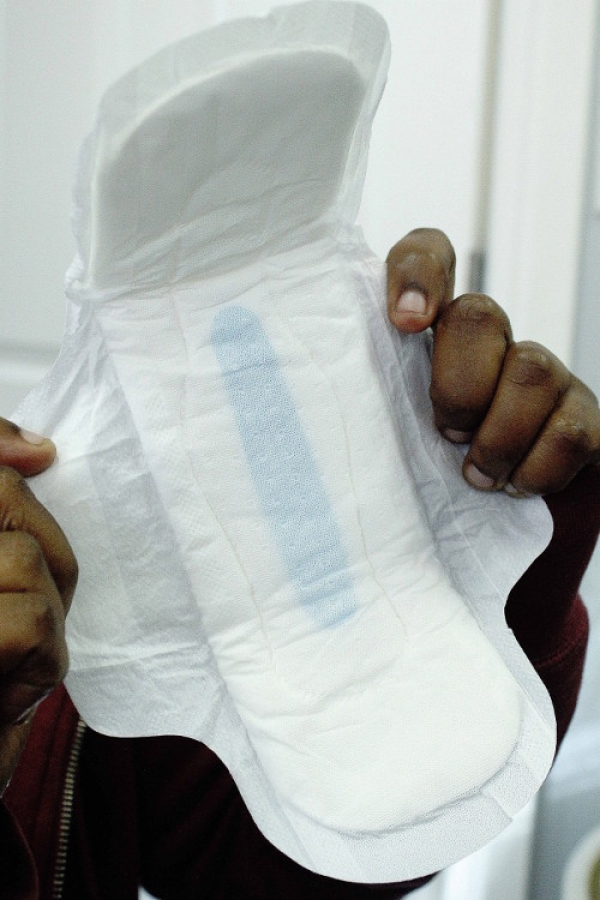

Photo by Masixole Feni.
12 May 2015
It has been four years since President Jacob Zuma promised that sanitary pads would be provided for poor women and girls in South Africa. But repeated attempts by GroundUp to find out what has been done suggest that his promise has not been kept.
GroundUp first approached the presidency last November to find out what had been done to meet the commitment made by Zuma in 2011. At the time President Jacob Zuma told ANC supporters during the 8 January celebrations of the ANC’s 99th anniversary at Peter Mokaba Stadium in Polokwane, Limpopo, that sanitary towels would be available soon.
He said the government would promote a free sanitary towels campaign in an effort to help those who cannot afford them.
On 10 January 2011 this promise was welcomed by the ANC Youth League. “The practicalisation of this request is a sign that ANC deeply cares about the wellbeing of the people of South Africa, in particular poor females,” the Youth League said.
A month later, during his State of the Nation address, Zuma reiterated his promise: “Given our emphasis on women’s health, we will broaden the scope of reproductive health rights and provide services related to amongst others, contraception, sexually transmitted infections, teenage pregnancy and sanitary towels for the indigent.”
Following a Groundup article on students who miss school when they are menstruating because they cannot afford sanitary pads, GroundUp attempted to find out what had happened to the president’s promise.
We emailed the presidency’s media office, the presidency’s own email address, and the president’s private office. We were referred back to the Department of Basic Education, which in turn referred us to the Department of Social Development. However, staff in this department assured us that the provision of sanitary towels had nothing to do with them.
Finally, GroundUp approached the spokesman for the President, Mr Mac Maharaj (before he retired), but our email was not answered.
We also approached the deputy minister in the presidency, Buti Manamela, following the presidency’s announcement on 20 November last year that Manamela would walk 9.4km as part of the 2014 Nelson Mandela Sport and Culture Day in Pretoria: “The cause chosen by Deputy Minister Manamela is putting an end to no pads, no school days for young schoolgirls”, the presidency said.
But instead of eliciting information, our approach to the deputy minister prompted a complaint to the press ombudsman by Manamela’s spokesperson, Matshepo Seedat. The complaint was resolved and on 20 March 2015 Seedat agreed to provide us with information.
However, after several reminders, all she offered, on 8 April 2015, was: “Deputy Minister Buti Manamela is a champion of education because education unlocks otherwise closed doors for young South Africans and education is the key to breaking the cycle of poverty. He has been advocating making education fashionable during his 11 year tenure at the National Secretary of the Young Communist League.
“Minister partnered with Dignity Dreams for the Nelson Mandela walk for freedom because of his passion for education and learning. Subsequent to the walk Deputy Minister paid a visit to the factory where the sanitary towels are manufactured and met with the workers. Deputy Minister will also be handing out sanitary towels to young girls in Makhado Limpopo on 24 April at a career expo.”
On 20 April 2015 she later added that “deputy Minister has been involved with the campaign to provide sanitary towels to girls as National Secretary of the Young Communist League (YCL) and it is something he has always been passionate about. The provision of sanitary towels to young girls is not something that falls within the Deputy Minister’s portfolio hence there is no budget for it in the Deputy Minister’s office”
“On the 13 May we will be hosting an event where Buti Manamela, Deputy Minister in the Presidency will publicly endorse our campaign. It is envisaged that once this announcement is made, we will attract the corporate support needed for us to roll our campaign out in all nine provinces”, said Matshepo.
On 21 April 2015, GroundUp spoke to the communication spokesperson in the presidency, Zanele Mngadi, who promised to reply if we sent her an email. We sent emails to szanele [at] presidency.gov.za, macmaharaj [at] icloud.com, presidentsa [at] presidency.gov.za and president [at] presidency.gov.za.
A day later GroundUp telephoned Mngadi, only to be told she was too busy to respond to our emails.
“I am in a meeting the whole day I will not be able to respond to your email. I am busy. I receive hundreds of emails a day and did not see yours. I do not know when I can respond to your email”, she said.
She told GroundUp to communicate with Bongani Majola, also in the communication office. Majola did not respond to any of GroundUp’s emails, messages or telephone calls.